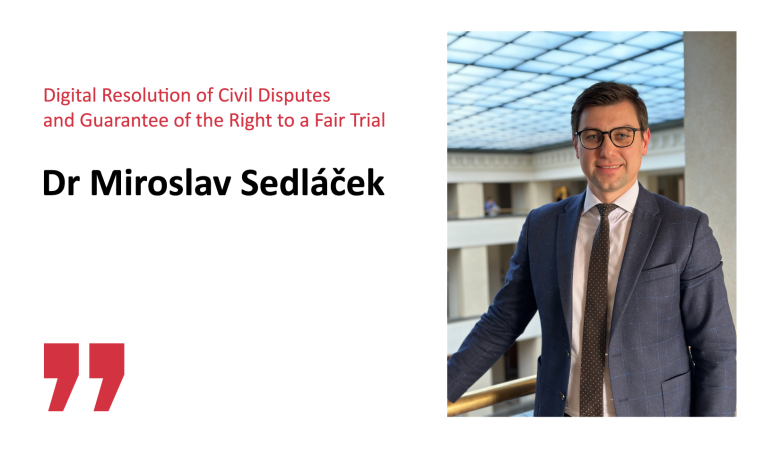Czech Science Foundation Supports Dr Miroslav Sedláček’s Project “Digital Resolution of Civil Disputes and Guarantee of the Right to a Fair Trial”

Czech Science Foundation Supports Dr Miroslav Sedláček’s Project “Digital Resolution of Civil Disputes and Guarantee of the Right to a Fair Trial”
Your project called the Digital Resolution of Civil Disputes and Guarantee of the Right to a Fair Trial gained support from the Czech Science Foundation (GACR) last year. What is the aim of the project?
As its name suggests, the aim of the project is to investigate the resolution of civil disputes using digital technology and artificial intelligence (AI) while guaranteeing the right to a fair trial, in particular with regard to instituting proceedings and the proceedings as such, including the decision-making process. In many respects, the current system does not provide efficient and adequate judicial protection of rights. And if the technology available is used appropriately in civil proceedings, it could remedy this situation.
Your project is being supported from 1 January of this year. What does the start of such a demanding task look like?
Most importantly, the research team has regular meetings, where we discuss individual aspects of the project. At the moment, we are specifically looking into the issue of instituting contentious proceedings using modern technology, for example, intuitive forms for filing applications to court, or the use of an electronic case file and its form. We research source materials, discuss our opinions with other academics, experts, and legal practitioners, while focusing, from the very beginning, on the individual publication outputs. On the administrative level, we have been collaborating with the Department of Science, Research, and Publications of our Faculty, which has done a great job (thank you!).
I found it intriguing that the project aims to explore the use of artificial intelligence and digital resolution of disputes in borderline cases. Is it a standard practice today to use AI as a “judge”? I’ve heard that it in the US, such technology is commonplace. What are the advantages and disadvantages of involving artificial intelligence in law? And is the Czech legal environment ready for this?
We are indeed looking into the involvement of artificial intelligence and digital resolution of disputes in borderline cases. The use of AI as a “judge” is still not considered a standard practice. This is also why Juan Manuel Padilla, a Columbian judge in the Caribbean city of Cartagena, who decided a case concerning the payment of costs of the medical treatment for an autistic child, caused such a stir. He used the ChatGPT chatbot in his decision-making, which uses AI to automatically generate responses to various topics. The final decision was in line with the chatbot’s decision, outraging other judges who are opposed to involving similar applications in their ruling. On the contrary, John G. Roberts, Chief Justice of the US, when asked whether he could foresee a day when artificial intelligence would be used in the judiciary, responded that “[i]t’s a day that's here”. This might very well be the start of a revolution that will change the way we perceive law, the judiciary, and justice. And is the Czech legal environment ready for this? Well, that’s a question we’re trying to answer.
What is the schedule for the project in the coming years? Is there a research team yet?
We do have an exact schedule for the project. We are working on different papers, and we have also started working on a monograph, which is going to be the main publication output of the project. We are also planning our first workshop in autumn, where we will present the research results reached to date. This is also what we want to do in the years to come. As for the research team, it is composed of six young promising researchers who have been studying the topic at hand for a long time. It works to our advantage that we have experience from abroad, but also practical experience in the judiciary. Also, one of our colleagues works at the Czech Academy of Sciences. The composition of the team has already received a very positive evaluation in the opinions on the draft project.
You mentioned that you’ve already started working on a monograph. Can you describe the publication?
We are planning to publish a monograph with the results of the entire research in the third year of the project, with the hope of attracting a foreign publisher. It should elaborate the individual publication outputs by members of the research team, some of which are also going to be published in foreign languages. We are well aware that our primary focus is the Czech legal environment and Czech legal experts since this is where we want to propose changes with the aim of introducing digital technology in contentious civil trials.
Does the project involve any experiments?
No, we are not planning any experiments, at least for the moment (laughter).
Are you going to participate in any conferences?
Yes, active participation at conferences is part of the project. I believe that it would be difficult, and perhaps even impossible, to reach the aim of the project without presenting the research results and discussing them. The research team is therefore going to attend conferences in the Czech Republic as well as abroad, for example, the International Conference on Artificial Intelligence and Law in Braga in Portugal in June, or the international symposium Law, Business and Economics in Štrbské pleso in Slovakia a part of which is dedicated to innovation and modern technology in law. We are also going to travel to the universities in Hamburg, Leuven, and Luxembourg. We are already in touch with our colleagues there, and we are planning to discuss the issues we are studying with them, and learn from their experience in the field.
Author of the interview:
BcA. Pavel Nesit, editor of the Department of Public Relations








